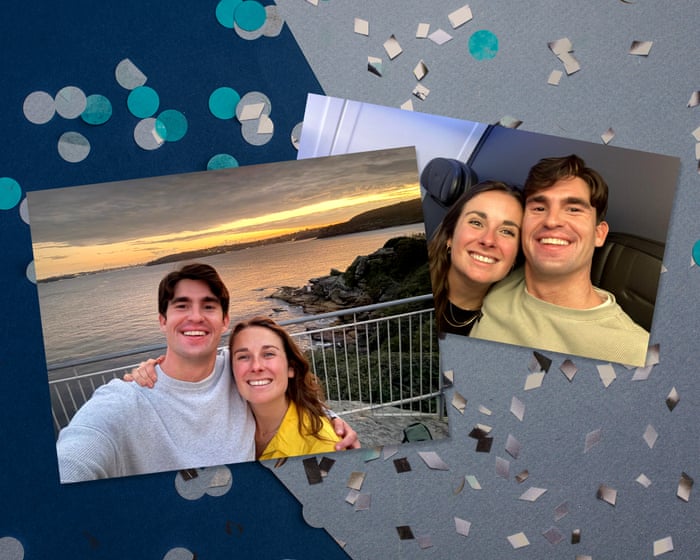Tom Grennan in 1998 and 2025
Later photograph: Pål Hansen/The Guardian. Styling: Andie Redman. Grooming: Neusa Neves at Arlington Artists using Lelive skincare and Mario cosmetics. Archive photograph: courtesy of Tom Grennan.
Born in 1995 in Bedford, Tom Grennan rose to fame as a guest vocalist on Chase & Status’s 2016 track All Goes Wrong, which earned him a spot on the BBC Sound of 2017 list. Blending soul, pop, and indie rock, he released his debut album, Lighting Matches, in 2018 and has since sold over 1.5 million albums and amassed 2.5 billion streams. His latest album, Everywhere I Went Led Me to Where I Didn’t Want to Be, is out now, and he begins touring in September.
On the childhood photo:
This was taken in my parents’ first house in Bedford. It must have been Halloween, though I’m not sure what kind of monster wears socks on his hands and a Tom and Jerry T-shirt. I look happy but wild—that scrape on my face was probably from falling off my bike.
My childhood was full of love. My mum was a teacher, and my dad was a builder. They worked hard but were always there for me. Mum played a lot of pop—Madonna, Robbie Williams—while Dad loved Irish music and played the accordion. We were working-class, and though we didn’t have much, I never felt like I was missing out. We lived on a quiet street with a back garden, and all I needed was a football. Mum says I was a handful but also kind and emotional.
On school:
I was popular, though not exactly a jock—being good at football helped. Socially, I did fine, but I was a troublemaker in class. Dyslexia made it hard to focus, so I’d mess around instead. My school had a bizarre system where they grouped kids by behavior, so I spent four years in the “naughty” class with seven others. I barely did any work and got excluded a few times—mostly for being a pain. While my friends got to go home and play PlayStation, my mum dragged me to her school and made me sit in isolation.
On discovering his voice:
I had no idea I could sing until I was 18 at a party after A-levels. I was properly drunk for the first time, and when Seaside by The Kooks came on, I belted it out. People were shocked—they made me sing without the music. Their reactions gave me confidence, and suddenly I went from being the football guy to the guy who sang in a band.
On Bedford and the attack:
Bedford is a small town where everyone knows everyone—which isn’t always good. Once I started singing, some friends turned jealous, asking, Who do you think you are? Then, one night outside a chicken shop, I was attacked by strangers. The injuries were severe—I needed jaw surgery and had metal plates until recently. It wasn’t just my body that changed; my mind felt rewired. I went from feeling like the golden boy to thinking the whole world hated me.
On depression and self-destruction:
I spiraled into deep depression, suffocated by dark thoughts. I nearly lost my career because I was self-destructing—going on benders that lasted days. At my lowest, I didn’t know if I’d make it.I could either stay stuck or go out and do something reckless to the people who had hurt me. Before the attack, I was outgoing—always seeking adventures without worrying about consequences. Afterward, I became withdrawn, afraid to even leave the house.
My personality changed so much that most of my school friends drifted away, except for two who remain my closest friends to this day. In that loneliness, I found solace in writing. I poured my feelings onto paper and taught myself to play the guitar. My mum constantly asked how I was doing, but I could never explain it properly—unless I turned it into a song. Writing music became my way of processing emotions, and it set me on a new path.
Whenever I had a free evening, I’d head to London for open-mic nights. I was clueless about the industry or how to get noticed, but I loved performing and meeting other musicians. Back then, I was the picture of an indie kid—patchy beard, nose piercings, skinny jeans, hats, and thrift-store sweaters. Things changed when I posted a song online and played a pub gig. Someone from a record label reached out, asking, “Are these your songs?” When I said yes, he invited me to meet him. That’s how it all started.
In London’s music scene, no one knew my past. I saw a chance to reinvent myself—to be the always-smiling guy hiding his struggles. But I ended up surrounded by the wrong crowd. There’s more awareness now about substance abuse, but back then, the rock-and-roll lifestyle was the norm for artists. I became the one who partied hardest, the loudest in the room.
For about five years, I coasted professionally. I released records, did okay, but nearly got dropped at one point because I kept self-destructing. My benders would last days, and I’d disappear alone.
In early 2020, my mum stayed with me and quickly realized how badly I was living. I was lost, neglecting myself from too much partying. “It’s time to come home,” she said. Then lockdown hit. London wasn’t an option—I needed to be around people who loved me. So I stayed in Bedford. I got healthy, mentally and physically, reconnecting with family and old friends over Zoom.
Now, I only drink on special occasions and with good people. I got married last year to a pilates instructor who keeps me grounded. Writing and being in the studio bring out the best in me. I know it sounds boring, but it’s true. For years, I lost touch with the kind, emotional kid I used to be. It took me a decade to figure it out, but I’m finally getting back to myself.I’ve done everything I can to get back to him.
FAQS
### **FAQs About Tom Grennan’s Reflection: “After the attack, I went from believing I was loved to feeling hated.”**
#### **Basic Questions**
**1. What happened to Tom Grennan?**
Tom Grennan was physically attacked in 2020 after a night out in London, leaving him with a fractured jaw and torn eardrum.
**2. What did Tom Grennan mean by his statement?**
He meant that the attack shattered his sense of security and self-worth, making him feel hated instead of loved.
**3. When did the attack happen?**
The assault occurred in April 2020.
**4. How did the attack affect Tom Grennan?**
It left him with physical injuries and emotional trauma, changing his outlook on life and trust in people.
—
#### **Intermediate Questions**
**5. Did Tom Grennan speak about the attack publicly?**
Yes, he has discussed it in interviews and through his music, using his experience to raise awareness.
**6. How did Tom Grennan recover from the attack?**
He underwent surgery for his injuries and relied on therapy, family support, and music to heal emotionally.
**7. Has the attack influenced his music?**
Yes, his album *Evering Road* reflects his emotional journey after the incident.
**8. Were the attackers ever caught?**
Yes, two men were arrested and sentenced for the assault.
—
#### **Advanced Questions**
**9. How has Tom Grennan’s perspective on fame changed since the attack?**
He has become more cautious about public spaces and has spoken about the darker side of fame.
**10. What advice has Tom given others who’ve experienced trauma?**
He encourages seeking professional help and finding healthy outlets, like music or therapy.
**11. Did Tom Grennan forgive his attackers?**
He hasn’t spoken explicitly about forgiveness but focuses on moving forward positively.
**12. How has the attack shaped his relationship with fans?**
He’s more open about his struggles, creating a deeper connection with his audience.
—
#### **Practical Tips & Takeaways**
**13. How can fans support Tom Grennan after what happened?**
By respecting his story, engaging with his music, and promoting kindness and safety.



